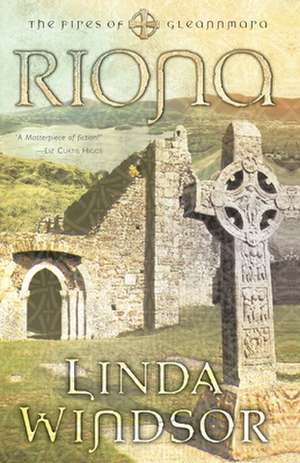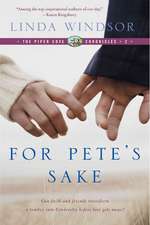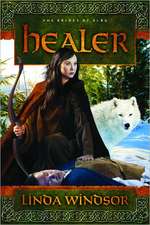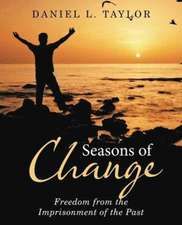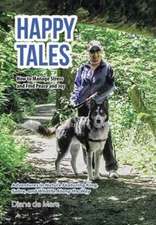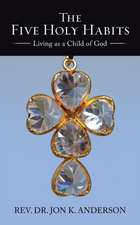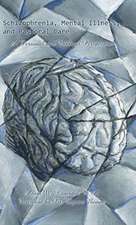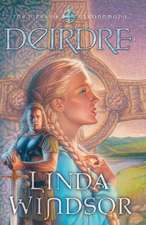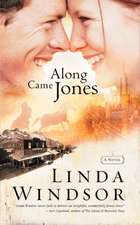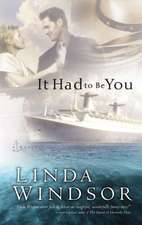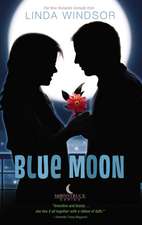Riona: Fires of Gleannmara Series, cartea 2
Autor Linda Windsoren Limba Engleză Paperback – 31 aug 2001
Vezi toate premiile Carte premiată
Christy Awards (2002)
Preț: 100.94 lei
Nou
Puncte Express: 151
Preț estimativ în valută:
19.32€ • 20.38$ • 16.10£
19.32€ • 20.38$ • 16.10£
Carte disponibilă
Livrare economică 12-26 decembrie
Preluare comenzi: 021 569.72.76
Specificații
ISBN-13: 9781576737521
ISBN-10: 1576737527
Pagini: 350
Dimensiuni: 140 x 216 x 25 mm
Greutate: 0.48 kg
Editura: Multnomah Books
Seria Fires of Gleannmara Series
ISBN-10: 1576737527
Pagini: 350
Dimensiuni: 140 x 216 x 25 mm
Greutate: 0.48 kg
Editura: Multnomah Books
Seria Fires of Gleannmara Series
Notă biografică
Linda Windsor is an award-winning author of nineteen historical and five contemporary novels who lives on the Eastern Shore of Maryland. A former professional singer, musician, and ABA writer, Linda gave her music and writing over to God with initial protest but without regret. She believes laughter is God's prescription for the tears of life, and the icing on the cake of faith.
Extras
Chapter One
570s Dalraidi Scotia Minor frontier, early spring…
The mist over the loch was so thick a body could walk on it. It permeated the tunics and cloaks of the warriors on the bloodied banks at the lake’s edge. Kieran of Gleannmara walked among the wounded and slain, his lean, muscled legs as heavy as those of the dead. It was wrong, all wrong, he thought, turning over this body and that, numbly searching their features, now waxed in the horror of their demise. What the devil had happened?
Their early morning raid took the enemy by surprise and routed the marauding pirates from their stronghold on the bank. Bold when striking a helpless trading vessel, the cowardly brigands had scattered like smoke in the wind in the face of Kieran’s forces. They’d either taken to the water in whatever would float or disappeared into the thick air at the Dalraidi’s charge. At least that’s what was thought. The main of the Dalraidi forces, among them Kieran’s mercenary warriors from Gleannmara, had turned to looting. The more for King Aidan, the more for them.
It wasn’t the loot that attracted Kieran, a young lord from Erin’s tuath by the Wicklows. It was the adventure, the prospect of putting the long years of training in warfare to use. For all the heath fruit of Brigh Leithe could not make enough beer to induce the euphoria of plunging into combat, weapon to shield, blade to flesh, and—if need be—brutish hand to brutish hand. The greatest challenge at home was an occasional cattle raid or petty clan squabble and scholastic pursuit. Aye, it was good exercise for the mind, and Kieran of Gleannmara’s fine, muscled body and keen battle senses demanded testing.
Young, hot-blooded, and eager to put their training to practice, Kieran and his chiefs had left with the high king’s blessing to join King Aidan of the Dalraidi Scots on his campaigns against pirates who had been harassing his fleet and the trade routes along the coastal waters. The restless young warriors from the various clan lands of Gleannmara
had rallied enthusiastically to Kieran’s call for volunteers to help their Scottish cousins establish their domain across the sea.
Mayhap a year later Kieran hoped to return, richer and wiser, yet on this day, and at this hour, he would give his share of the sacks and carts filled with booty to see his men—men he’d grown up with, attended school with, and learned to fight with—rise up from their still-blooded sleep. What in the name of Gleannmara’s useless God had gone wrong? What had happened to the rear guard?
The sight of the well-armed and fresh enemy pouring down from the same craggy hill that Kieran and his men had just descended had taken Kieran and his men off balance. Only sheer will and raw courage helped them prevail. Countless bodies later, the enemy was routed for the second time and chased down until none lived in the godless mingle
of lethal rock and bog that nestled the loch.
Kieran climbed the rocky rise, his limbs burning from exhaustion, only faintly aware of the fresh streamlets of blood the effort opened on his cut and bruised flesh. Faith, he felt colder than the dead surrounding him.
Kieran adjusted his cloak, securing it with a jeweled gold brooch worthy of his kingly station. All Gleannmara’s royalty had worn it proudly. Its precious stones represented the union of Gleannmara’s founding clans, placed in reverence around a silver inlaid Chi-Roh. As he fastened it, Kieran’s staggered thoughts turned from instinct to reason.
If the rear guard had failed and let the enemy regroup behind them, then—
“Kieran, God’s mercy, hurry!”
At the top of the rise, Bran O’Cuillin—bard, would-be priest, and friend—waved at Kieran frantically. The young king’s heart seized, run through by a terrible dread as logic came to conclusion. The rear guard was no more. And if that was so, then the O’Cuillins of Dromin, the clan who had raised Gleannmara’s prince in fosterage and trained him under its champion, Murtagh, had been defeated. The image of his foster brother, the late Murtagh’s son, flashed before him. Heber! Kieran broke into a run, dodging and leaping over the bodies that lay in his path.
“It’s Heber,” Bran sobbed, confirming Kieran’s worst fear.
Kieran mouthed the name and ran even harder after his foster brother’s cousin. Heber was not Kieran’s brother by blood. By law, Dromin’s O’Cuillins were part of tuatha Gleannmara and owed allegiance to Kieran. But Heber was more than chief of a subkingdom. He was Kieran’s anmchara, his soul mate. They shared life and all their secrets, their dreams. Heber’s breath was Kieran’s and vice versa since the day
Kieran arrived at Dromin to be tutored in the art of war.
As Kieran broke over the ridge, his stomach turned at the sight of the carnage. The white leather tunics of Heber’s men dotted the moss and rock-covered plain, their bodies bleeding scarlet. Bran dropped to his knees beside one of the fallen and began crossing himself and praying. The large warrior lying before the bard, drew up one leg unsteadily,
as if trying to get up.
Relief nearly tripped Kieran. The chief of the O’Cuillin, the clan that had remained behind to guard the rear of their attacking force, was alive. Thank God! God had done little for Kieran since he’d lost the innocence of his youth. In truth, since Kieran’s parents’ death by the plague, he’d cursed the Christian God of his upbringing more times
than he’d spoken to Him.
But for this, he had to give thanks.
He didn’t deserve God’s favor, but the faithful Heber certainly did. Heber’s trials, of which there’d been many, never shook his faith. Kieran always said Heber had enough for the two of them.
“If God’s not going to staunch his wounds,” Kieran said to Bran, “then stop praying and at least help me.”
Tearing his cloak from over his head, Kieran made a pillow of it and tucked it under Heber’s head. The wounded warrior’s black hair stood out in stark contrast to the cerulean blue of Gleannmara’s colors—as did the blood soaking it.
“And how many brigands did Eimar help cross over before they learned that striking your head was for naught?”
Heber’s hand tightened around the hilt of Eimar, his sword, as if to make certain it was still there and ready. He tried to laugh, but choked instead. Blood trickled out the side of his mouth, fresh and ominous. When at last he could speak, his voice gurgled. “Up.”
Kieran hastened to help his broad-shouldered friend sit upright. Undoubtedly, he bled internally. Sitting upright would at least help him breathe.
It was then that Kieran saw the gnarled hilt of a dagger lying broken where Heber had lain. Instinctively, Kieran felt for its blade. As he feared, it was buried in the large warrior’s back, just below the shoulder blade. His tunic must have twisted in the heat of the battle, leaving a seam exposed for one very lucky thrust. The tendons of Kieran’s throat stretched fit to burst with the tortured cry of rage and agony he held back.
“Kieran.” Bran glanced meaningfully as his elder cousin tried to find Kieran with his gaze.
Cradling Heber’s head, Kieran eased him down like a babe and looked into his eyes. The ever-present twinkle was gone, replaced by a gripping desperation. No clever words of distraction came to Kieran’s mind. His eyes stung so mightily it was hard to focus on Heber’s face.
“P…promises.” Heber let Eimar go, transferring his waning strength to Kieran’s arm. “Remem…remember the promises.”
Was it only last night Heber brought up the possibility that not all of Gleannmara’s men would return to its precious soil? It felt like half a lifetime ago. Kieran had owned his friend’s thought to Bran’s musical rendition of an old tale of Irish warriors shipwrecked on a green island far to the north, beyond the ken of man. Had Heber had some
forewarning of this fate instead?
“Aye, I remember.” His blood curdled at what he must do, what he’d given his oath to do.
“T-tell me.”
Kieran sensed more than heard Heber’s words, for his lifelong friend was too weak to speak. His youthful strength soaked into the moss-covered ground beneath them.
“Though I can’t carry you home, I’ll not abandon you to heathen soil.”
“Merciful Father!” Bran cared not who heard his cry or saw the tears streaking his face.
How Kieran envied the bard that freedom of manly constraint. His own pain longed to make itself known all the way to the halls of Gleannmara.
“And—” Kieran went on after a brace of breath—“I will take your sister into the protection of Gleannmara as my wife.” Heber convulsed and swallowed his own life’s blood. “On your word.”
“On my word as your brother in heart and soul, and as your king.” Where the detached voice Kieran recognized as his own came from, he had no idea. Surely not from the black sea tossing his emotions on its crest like the remnants of a doomed wreck.
The reassurance was like a strengthening balm. Heber smiled and a familiar twinkle lighted in the depths of his gaze. “Then I shall see you and Bran on the other side. His tone was as light as when he’d teased his cousin Bran the night before for choosing a harp rather than a sword for his companion.
With that, the light went out in the lifeless blue of his eyes, and they stared not at Kieran, but past him, unfocused to all that was of this earth.
Bran helped Kieran lay their fallen comrade out. As Kieran took Eimar from Heber’s side, he was aware that the septs and subsepts of Gleannmara had gathered around them, waiting, watching. The bard could not speak for crying, yet, when he crossed himself and took up the harp, which lay discarded nearby, his voice rang as clear as the strings with a song.
Part hymn, part eulogy, Bran’s composition was worthy of the ancient poet Ossian himself. When honor was done to Heber and the bard’s petition for the receipt of his soul into heaven by God and Creator of all things was ended, Kieran raised Eimar above his head with both fists.
Now he could scream. It increased the force of the blade he brought down with unfettered fury and anguish. Heber had known—as had they all—that the warriors could not carry back the bodies of their slain to the Dalraidi stronghold of Dunadd for proper Christian
burial. Well they knew that the heathens would mutilate their fallen enemies, so all Heber asked of Kieran was to take the essence of a man, of all that he was…
His head.
570s Dalraidi Scotia Minor frontier, early spring…
The mist over the loch was so thick a body could walk on it. It permeated the tunics and cloaks of the warriors on the bloodied banks at the lake’s edge. Kieran of Gleannmara walked among the wounded and slain, his lean, muscled legs as heavy as those of the dead. It was wrong, all wrong, he thought, turning over this body and that, numbly searching their features, now waxed in the horror of their demise. What the devil had happened?
Their early morning raid took the enemy by surprise and routed the marauding pirates from their stronghold on the bank. Bold when striking a helpless trading vessel, the cowardly brigands had scattered like smoke in the wind in the face of Kieran’s forces. They’d either taken to the water in whatever would float or disappeared into the thick air at the Dalraidi’s charge. At least that’s what was thought. The main of the Dalraidi forces, among them Kieran’s mercenary warriors from Gleannmara, had turned to looting. The more for King Aidan, the more for them.
It wasn’t the loot that attracted Kieran, a young lord from Erin’s tuath by the Wicklows. It was the adventure, the prospect of putting the long years of training in warfare to use. For all the heath fruit of Brigh Leithe could not make enough beer to induce the euphoria of plunging into combat, weapon to shield, blade to flesh, and—if need be—brutish hand to brutish hand. The greatest challenge at home was an occasional cattle raid or petty clan squabble and scholastic pursuit. Aye, it was good exercise for the mind, and Kieran of Gleannmara’s fine, muscled body and keen battle senses demanded testing.
Young, hot-blooded, and eager to put their training to practice, Kieran and his chiefs had left with the high king’s blessing to join King Aidan of the Dalraidi Scots on his campaigns against pirates who had been harassing his fleet and the trade routes along the coastal waters. The restless young warriors from the various clan lands of Gleannmara
had rallied enthusiastically to Kieran’s call for volunteers to help their Scottish cousins establish their domain across the sea.
Mayhap a year later Kieran hoped to return, richer and wiser, yet on this day, and at this hour, he would give his share of the sacks and carts filled with booty to see his men—men he’d grown up with, attended school with, and learned to fight with—rise up from their still-blooded sleep. What in the name of Gleannmara’s useless God had gone wrong? What had happened to the rear guard?
The sight of the well-armed and fresh enemy pouring down from the same craggy hill that Kieran and his men had just descended had taken Kieran and his men off balance. Only sheer will and raw courage helped them prevail. Countless bodies later, the enemy was routed for the second time and chased down until none lived in the godless mingle
of lethal rock and bog that nestled the loch.
Kieran climbed the rocky rise, his limbs burning from exhaustion, only faintly aware of the fresh streamlets of blood the effort opened on his cut and bruised flesh. Faith, he felt colder than the dead surrounding him.
Kieran adjusted his cloak, securing it with a jeweled gold brooch worthy of his kingly station. All Gleannmara’s royalty had worn it proudly. Its precious stones represented the union of Gleannmara’s founding clans, placed in reverence around a silver inlaid Chi-Roh. As he fastened it, Kieran’s staggered thoughts turned from instinct to reason.
If the rear guard had failed and let the enemy regroup behind them, then—
“Kieran, God’s mercy, hurry!”
At the top of the rise, Bran O’Cuillin—bard, would-be priest, and friend—waved at Kieran frantically. The young king’s heart seized, run through by a terrible dread as logic came to conclusion. The rear guard was no more. And if that was so, then the O’Cuillins of Dromin, the clan who had raised Gleannmara’s prince in fosterage and trained him under its champion, Murtagh, had been defeated. The image of his foster brother, the late Murtagh’s son, flashed before him. Heber! Kieran broke into a run, dodging and leaping over the bodies that lay in his path.
“It’s Heber,” Bran sobbed, confirming Kieran’s worst fear.
Kieran mouthed the name and ran even harder after his foster brother’s cousin. Heber was not Kieran’s brother by blood. By law, Dromin’s O’Cuillins were part of tuatha Gleannmara and owed allegiance to Kieran. But Heber was more than chief of a subkingdom. He was Kieran’s anmchara, his soul mate. They shared life and all their secrets, their dreams. Heber’s breath was Kieran’s and vice versa since the day
Kieran arrived at Dromin to be tutored in the art of war.
As Kieran broke over the ridge, his stomach turned at the sight of the carnage. The white leather tunics of Heber’s men dotted the moss and rock-covered plain, their bodies bleeding scarlet. Bran dropped to his knees beside one of the fallen and began crossing himself and praying. The large warrior lying before the bard, drew up one leg unsteadily,
as if trying to get up.
Relief nearly tripped Kieran. The chief of the O’Cuillin, the clan that had remained behind to guard the rear of their attacking force, was alive. Thank God! God had done little for Kieran since he’d lost the innocence of his youth. In truth, since Kieran’s parents’ death by the plague, he’d cursed the Christian God of his upbringing more times
than he’d spoken to Him.
But for this, he had to give thanks.
He didn’t deserve God’s favor, but the faithful Heber certainly did. Heber’s trials, of which there’d been many, never shook his faith. Kieran always said Heber had enough for the two of them.
“If God’s not going to staunch his wounds,” Kieran said to Bran, “then stop praying and at least help me.”
Tearing his cloak from over his head, Kieran made a pillow of it and tucked it under Heber’s head. The wounded warrior’s black hair stood out in stark contrast to the cerulean blue of Gleannmara’s colors—as did the blood soaking it.
“And how many brigands did Eimar help cross over before they learned that striking your head was for naught?”
Heber’s hand tightened around the hilt of Eimar, his sword, as if to make certain it was still there and ready. He tried to laugh, but choked instead. Blood trickled out the side of his mouth, fresh and ominous. When at last he could speak, his voice gurgled. “Up.”
Kieran hastened to help his broad-shouldered friend sit upright. Undoubtedly, he bled internally. Sitting upright would at least help him breathe.
It was then that Kieran saw the gnarled hilt of a dagger lying broken where Heber had lain. Instinctively, Kieran felt for its blade. As he feared, it was buried in the large warrior’s back, just below the shoulder blade. His tunic must have twisted in the heat of the battle, leaving a seam exposed for one very lucky thrust. The tendons of Kieran’s throat stretched fit to burst with the tortured cry of rage and agony he held back.
“Kieran.” Bran glanced meaningfully as his elder cousin tried to find Kieran with his gaze.
Cradling Heber’s head, Kieran eased him down like a babe and looked into his eyes. The ever-present twinkle was gone, replaced by a gripping desperation. No clever words of distraction came to Kieran’s mind. His eyes stung so mightily it was hard to focus on Heber’s face.
“P…promises.” Heber let Eimar go, transferring his waning strength to Kieran’s arm. “Remem…remember the promises.”
Was it only last night Heber brought up the possibility that not all of Gleannmara’s men would return to its precious soil? It felt like half a lifetime ago. Kieran had owned his friend’s thought to Bran’s musical rendition of an old tale of Irish warriors shipwrecked on a green island far to the north, beyond the ken of man. Had Heber had some
forewarning of this fate instead?
“Aye, I remember.” His blood curdled at what he must do, what he’d given his oath to do.
“T-tell me.”
Kieran sensed more than heard Heber’s words, for his lifelong friend was too weak to speak. His youthful strength soaked into the moss-covered ground beneath them.
“Though I can’t carry you home, I’ll not abandon you to heathen soil.”
“Merciful Father!” Bran cared not who heard his cry or saw the tears streaking his face.
How Kieran envied the bard that freedom of manly constraint. His own pain longed to make itself known all the way to the halls of Gleannmara.
“And—” Kieran went on after a brace of breath—“I will take your sister into the protection of Gleannmara as my wife.” Heber convulsed and swallowed his own life’s blood. “On your word.”
“On my word as your brother in heart and soul, and as your king.” Where the detached voice Kieran recognized as his own came from, he had no idea. Surely not from the black sea tossing his emotions on its crest like the remnants of a doomed wreck.
The reassurance was like a strengthening balm. Heber smiled and a familiar twinkle lighted in the depths of his gaze. “Then I shall see you and Bran on the other side. His tone was as light as when he’d teased his cousin Bran the night before for choosing a harp rather than a sword for his companion.
With that, the light went out in the lifeless blue of his eyes, and they stared not at Kieran, but past him, unfocused to all that was of this earth.
Bran helped Kieran lay their fallen comrade out. As Kieran took Eimar from Heber’s side, he was aware that the septs and subsepts of Gleannmara had gathered around them, waiting, watching. The bard could not speak for crying, yet, when he crossed himself and took up the harp, which lay discarded nearby, his voice rang as clear as the strings with a song.
Part hymn, part eulogy, Bran’s composition was worthy of the ancient poet Ossian himself. When honor was done to Heber and the bard’s petition for the receipt of his soul into heaven by God and Creator of all things was ended, Kieran raised Eimar above his head with both fists.
Now he could scream. It increased the force of the blade he brought down with unfettered fury and anguish. Heber had known—as had they all—that the warriors could not carry back the bodies of their slain to the Dalraidi stronghold of Dunadd for proper Christian
burial. Well they knew that the heathens would mutilate their fallen enemies, so all Heber asked of Kieran was to take the essence of a man, of all that he was…
His head.
Descriere
Riona, a gentlewoman of faith, discovers that her plan to help the disadvantaged includes not only the plague orphans in her charge but also the arrogant adventurer who feels honor bound to save her and her lands by marrying her--with or without her consent. "Riona" reveals how the power of Christianity endures and grows in its second century in Ireland.
Premii
- Christy Awards Nominee, 2002
